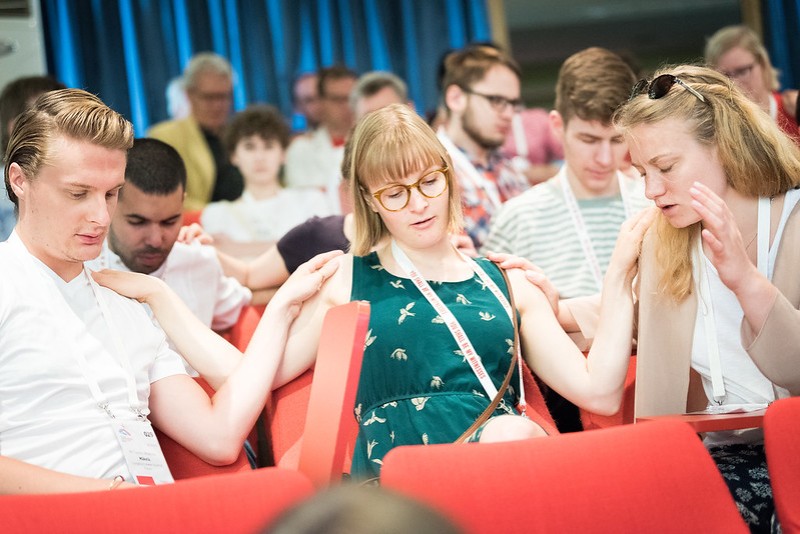The European Commission declared 2022 as European Year of Youth. On this occasion, the Conference of European Churches (CEC) together with the Ecumenical Youth Council in Europe (EYCE) and the World Student Christian Federation - Europe region (WSCF-Europe) have collected reflections from Christian youth in Europe about the importance and needs of ecumenical organisations. In a year marred by war, inflation, anxiety and the effects of multiple crises, they share about what gives them strength.
Renate Japenga from the Netherlands speaks about her calling to love God and her neighbour. “I participate in international ecumenical programs because I want to learn about the struggles of my neighbours in the worldwide church and outside,” she says.
However, lately she sometimes loses her hopes for a better world and a just life on earth for everyone. The things a country most needs, she says, are “healthcare, education, food security, solutions for climate change. Instead I hear more and more xenophobia, racism, discrimination.” Renate calls churches, “to stand up and raise a prophetic voice against all this.”
For her, to love God and one’s neighbour means to speak up when hearing about injustice and oppression. “Because every time I read about people or churches that speak truth to power, I feel a spark of hope. May our God bless our resistance,” she concludes.
Christiane Ehrengruber from Germany speaks about similar experiences. For her, being a Christian is a challenge. “It means standing up for justice and equality. It means being challenged by my secular environment,” she says.
Nonetheless, it also helps her to cope with the current times. She experiences being a Christian as empowering and welcoming, because it “also means being part of a global family. Having a space which is open and loving, challenging maybe, but filled with the knowledge that I am loved and accepted.”
In addition to feeling empowered, Aida Hanifi from Finland even finds that to her “faith means safety in the world.” Her ecumenical organisation has given her “a bigger picture of life in different countries” and “the most important things are feeling that we are doing this together and thinking about issues now going on in Europe.” To Aida, being together allows youth to “think about things together and God hopefully gives the wisdom.”
Given these experiences, Spyridoula Fotinis from the USA would like to see “more opportunities for ecumenical organizations to meet and cultivate fellowship between one another and then provide opportunities to engage in inter-religious and local community activities”.
Joline Marmé from Germany even sees ecumenical organisations as role models. “I think the ecumenical fellowship across Europe can be a good example for other organisations of finding common ground, accepting each other’s differences, and growing together through finding uniting aspects of our diverse religious identities.”
The journey of faith
Sarah Eulitz, also from Germany, describes her experience in a young and diverse ecumenical movement “like always being on the road towards a more just and peaceful world”.
“Faith is a journey which we all embark on together, as Christians of varied traditions but also as believers of other faiths and even, in some sense, atheists. This exploration is most valuable when we are able to share our ideas with others who may not agree with them,” says Patrick Ramsey, from England. For him, “ecumenism at its best is an open space where all are respected.”
Such spaces encourage him that he is “not only called to pray and speak, but also to act on behalf of those who are pushed aside by society”. He tells about the energy and time many young people put towards these goals. However, he concludes, “we can't do it alone. When we speak, we need our voices and beliefs to be taken seriously; only then will the opportunity to build a kinder future be in our hands.”
Encouraged in a similar way, Steven Edwards from Germany shares that “as a Christian, I do not have a choice but I am driven by my faith and my convictions to be politically active.” Steven believes that, “we are called to build a better society and to be a part of this world.” To do this work, Steven says, “I find strength, wisdom and endurance in God and in community with other Christians” and is inspired for a better present and future as a young Christian in Europe, “for everybody within and outside of Europe.”
CEC actively engages youth into its activities. In close cooperation with the World Student Christian Federation, Europe region, and the Ecumenical Youth Council in Europe, it contributes to creating spaces where young people can engage and raise their voices.
Learn more about the Ecumenical Youth Council in Europe
Learn more about the World Student Christian Federation – Europe
